As a Christian westerner I knew very little about Ramadan when it began on September 12th. I am far from an expert on Ramadan, but will share my experiences here.
First a basic, abbreviated description of Ramadan: it lasts for one lunar month (28 days), so its occurance varies yearly on the calendar. For Ramadan, Muslims fast during daylight hours - they go the entire day without any food or drink, not even water. After the evening prayer that coincides with sundown they break their fast with a meal that is called Iftar. Traditionally, the first foods they will eat are dates and water.
Although this description is simple, it has a huge impact on daily life in Islamic countries. For example, our classes at VCUQ were rescheduled by cutting 20 minutes off each class period and advancing all of the classes through the day to a new start time; one result was that my senior studio that usually ends at 6:00 PM ended instead at 4:40 PM. This was done so the students would be able to get home to break fast with their families, but also because they are very tired by the end of the day.
Most restaurants are closed during Ramadan daylight hours; the only exceptions in Doha that I was aware of (although I'm sure there were many others) were hotel restaurants and the cafeteria at Education City in the LAS building. And many businesses - even exercise classes - have modified hours. For example, the shops at Villagio, the shopping center closest to me, were open for a few hours in the morning, then closed and re-opened after sundown until past midnight. The Doha syndicate, where liquor is purchased, was closed the entire month. And just like Christmas in the USA, there are special decorations in most stores. Common greetings are Ramadan Kareem or Ramadan Mubarak (which translate as "Ramadan Blessings").
In orientation sessions at the beginning of the semester, new faculty were cautioned not to eat or drink in front of students during the day. As a lifetime Weight Watcher, who is seldom without a bottle of water, I had to really be careful about this - and in fact forgot the first day of Ramadan, but was kindly reminded by another faculty member to ditch my water bottle. Driving in Doha is often a bit scary, but during Ramadan it can be especially harrowing, so we were cautioned to stay off the roads just before sundown because many hungry Muslims would be headed to their family homes for Iftar. I actually found that advice to be untrue, but I did observe that traffic jams were more frequent during Ramadan, and, as soon as the evening call to prayer was heard, the streets were empty.
Many Qatari families gather for Iftar every night - children, grandchildren, aunts and uncles. For some, this is a time for lavish entertaining and parties that go into the wee hours of morning...and this will happen night after night. My students in families like that were wiped out during classes. Some fell asleep during class, few worked outside of class (as is expected in a design curriculum), and absences and excuses were rampant. And their performance dropped significantly, particularly during the last 10 days of Ramadan when additional prayers are to be said throughout the night.
Other families will have a large meal with their extended family for Iftar and another smaller meal in their own home just before they go to sleep around midnight. Then they will try to wake up a bit before daybreak for a light snack. My students, whose families approached Ramadan in this more moderate manner, tended to be more alert in class and got their work done. My office mate, Maryam, who graduated in the program several years ago and is now the department assistant, told me that she becomes so used not to eating during the day that she goes through a period after Ramadan when she has to become accustomed to having food during the day again.
This is also a time for special charity drives. Someone told me that good deeds performed during Ramadan are supposed to count double, but I don't know if that is true or not. It is also a time for travel. One of my students made a pilgrimage to Mecca with her father and brought back dates from Medina, and others traveled to see family (thus some of the absences in my classes). Several of my students who had not worn abayas before, started wearing them during Ramadan, and the English radio station I listen to devoted a considerable amount of time to special discussions about Ramadan and fasting. One discussion about whether you could brush your teeth or not during Ramadan (you cannot) stuck in my mind because of the serious tone of the speaker.
Some people are excused from fasting - e.g., pregnant women and those having their period, but they have to make it up later. I heard one student who was very concerned about this because she was caught in an uncomfortable situation: she was allowed to eat, but she couldn't do it because she didn't want anyone to know she was having her period. One woman told me that she preferred to fast while she was pregnant, because she didn't want to go through it alone later...I can only imagine what fasting Muslims in non-Islamic countries must go though to observe Ramadan - it's got to be tough for them.
Subscribe to:
Post Comments (Atom)













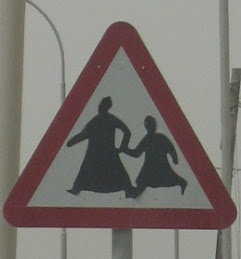



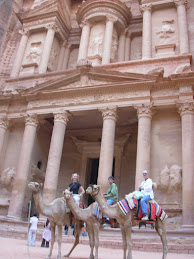.jpg)


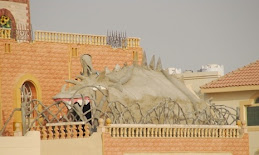








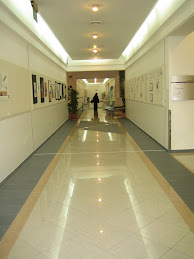

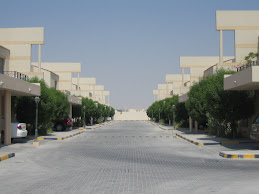



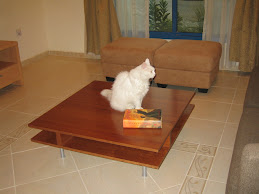


No comments:
Post a Comment